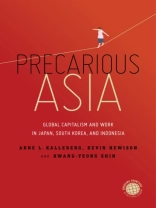Precarious Asia assesses the role of global and domestic factors in shaping precarious work and its outcomes in Japan, South Korea, and Indonesia as they represent a range of Asian political democracies and capitalist economies: Japan and South Korea are now developed and mature economies, while Indonesia remains a lower-middle income country.
With their established backgrounds in Asian studies, comparative political economy, social stratification and inequality, and the sociology of work, the authors yield compelling insights into the extent and consequences of precarious work, examining the dynamics underlying its rise. By linking macrostructural policies to both the mesostructure of labor relations and the microstructure of outcomes experienced by individual workers, they reveal the interplay of forces that generate precarious work, and in doing so, synthesize historical and institutional analyses with the political economy of capitalism and class relations. This book reveals how precarious work ultimately contributes to increasingly high levels of inequality and condemns segments of the population to chronic poverty and many more to livelihood and income vulnerability.
Daftar Isi
1. Precarious Work in Comparative Perspective
2. Japan, South Korea, and Indonesia
3. Global Capitalism, Domestic Policies, and Precarious Work
4. Dualisms of Precarious Work: Nonstandard Work, the Informal Economy, and Self-Employment
5. Precarious Work, Wages, and Social Protections
6. Precarious Work: Politics and Policies
Conclusion
Tentang Penulis
Arne L. Kalleberg is Kenan Distinguished Professor of Sociology at the University of North Carolina at Chapel Hill.
Kevin Hewison is Weldon E. Thornton Distinguished Emeritus Professor of Asian Studies at the University of North Carolina at Chapel Hill.
Kwang-Yeong Shin is Emeritus Professor of Sociology at Chung-Ang University in Seoul, Korea.












